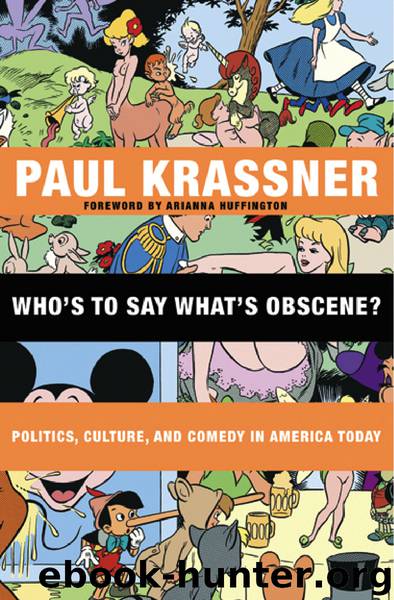Who's to Say What's Obscene? by Paul Krassner

Author:Paul Krassner
Language: eng
Format: epub
Publisher: City Lights Publishers
Published: 2013-11-21T16:00:00+00:00
4. SEVERAL DEAD ICONS
GINSBERG’S LAST LAUGH
Our paths had often crossed—at civil rights marches, antiwar rallies, marijuana smoke-ins, environmental demonstrations—he was always on the front lines, especially when it came to gay rights. Long before Ellen DeGeneres came out on a sitcom, Allen Ginsberg came out in the streets. On those occasions when we both performed at a benefit, I could hear his laughter reverberating from backstage like a Tibetan gong.
In the summer of 1982, there was a celebration of the twenty-fifth anniversary of Jack Kerouac’s On the Road at Naropa, a Buddhist college in Boulder, Colorado, where presumably they refer to his book as On the Path. I was invited to moderate a discussion, “Political Fallout of the Beat Generation.” The panelists: Ginsberg, William Burroughs, Abbie Hoffman and Timothy Leary. We were all asked to sign posters for the event. Hoffman wrote his signature extra large, with great care.
He explained, “The guy who shot John Lennon complained that Lennon gave him a sloppy autograph, so I ain’t takin’ any chances.”
During the panel, Ginsberg said, “I think there was one slight shade of error in describing the Beat movement as primarily a protest movement. That was the thing that Kerouac was always complaining about. He felt the literary aspect or the spiritual aspect or the emotional aspect was not so much protest at all, but a declaration of unconditioned mind beyond protest, beyond resentment, beyond loser, beyond winner—way beyond winner—beyond winner or loser . . . but the basic thing that I understood and dug Jack for was unconditioned mind, negative capability, totally open mind—beyond victory or defeat. Just awareness, and that was the humor, and that’s what the saving grace is. That’s why there will be political aftereffects, but it doesn’t have to win because having to win a revolution is like having to make a milliion dollars.”
As moderator, I asked, “Abbie, since you used to quote Che Guevara saying, ‘In a revolution, one wins or dies,’ do you have a response to that?”
HOFFMAN: “All right, Ginzo. Poems have a lot of different meanings for different people. For me, your poem Howl was a call to arms.”
GINSBERG: “A whole boatload of sentimental bullshit.”
HOFFMAN: “We saw in the sixties a great imbalance of power, and the only way that you could correct that imbalance was to organize people and to fight for power. Power is not a dirty word. The concept of trying to win against social injustice is not a dirty kind of concept. It all depends on how you define the game, how you define winning and how you define losing—that’s the Zen trip that was learned by defining that you were the prophets and we were the warriors. I’m saying that you didn’t fight, but you were the fighters. And I’ll tell you, If you don’t think you were a political movement and you don’t like winning, the fuckin’ lawyer that defended Howl in some goddamn obscenity suit—you wanted him to be a fuckin’ winner, I guarantee you that.
Download
This site does not store any files on its server. We only index and link to content provided by other sites. Please contact the content providers to delete copyright contents if any and email us, we'll remove relevant links or contents immediately.
Spell It Out by David Crystal(36109)
Professional Troublemaker by Luvvie Ajayi Jones(29648)
The Secret History by Donna Tartt(19039)
We're Going to Need More Wine by Gabrielle Union(19032)
Cat's cradle by Kurt Vonnegut(15330)
The Goal (Off-Campus #4) by Elle Kennedy(13651)
The Social Justice Warrior Handbook by Lisa De Pasquale(12184)
The Break by Marian Keyes(9357)
Crazy Rich Asians by Kevin Kwan(9274)
The remains of the day by Kazuo Ishiguro(8969)
Thirteen Reasons Why by Jay Asher(8887)
Educated by Tara Westover(8044)
The handmaid's tale by Margaret Atwood(7752)
Giovanni's Room by James Baldwin(7320)
Win Bigly by Scott Adams(7183)
This Is How You Lose Her by Junot Diaz(6873)
The Rosie Project by Graeme Simsion(6372)
Six Wakes by Mur Lafferty(6237)
The Power of Now: A Guide to Spiritual Enlightenment by Eckhart Tolle(5745)
